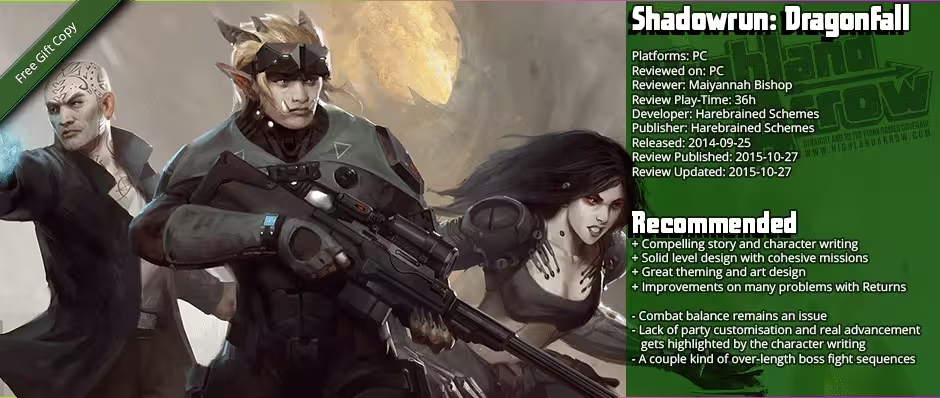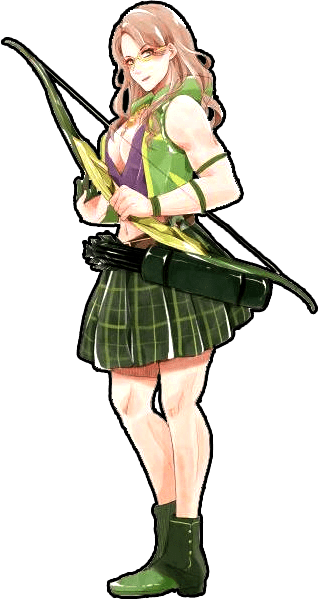

Shadowrun - Dragonfall is the second standalone installment in the Shadowrun reboot series designed and published by Harebrained Schemes. With Returns and Hong Kong leaving me relatively lukewarm at the very best, I felt it would be remiss of me if I didn't review the one entry in the series I was genuinely fond of, and as such here we are. Dragonfall has many of the bugs and design flaws its predecessors had, but it has one thing they didn't - a story that really interested me, drew me into the characters and the world, and compelled me to play this game to completion. Twice, now, and I suspect it won't be the last time, either. Out of the three, this is definitely the one I'd recommend if you were just looking for the best in this series, without question or hesitation. So if you were just looking to know whether this one is good or not after the previous reviews, read no further than this, because it is. If you want to know more, however, read onward!
Dragonfall has good characters in spades
And this is what sets it apart from the other two games really, in my mind, above anything else. Where I found all but one of the characters in Hong Kong either annoying or insipid, and I can't really give Returns credit for the one character I enjoyed there since they lifted him from the SNES game, the entirety of Dragonfall's lineup are interesting and memorable characters.
From the ex-military woman Eiger to the chromed-to-the-gills Glory or the street shaman Dietrich, each of the characters has their own unique and pretty well-fleshed out stories that both tie in well to the Shadowrun setting and are fairly decently unique to their characters. They stand out a bit from their surroundings and that's important, whereas for example there was nothing to really make most of the characters in the other two games stand out from any other random NPC you could hire to bring with you. Other than their incessant whining. There's none of that here, though. The characters speak up only at plot-important points so it's not the same incessant bother, and most importantly to flow, it's when you expect they would - most commonly, for example, when there's a decision that impacts the whole team that they then discuss amongst themselves.
Each of the members of your shadowrun team have their own unique stories, and they're all fairly interesting to my mind, some more than others mind you. I found Eiger's own story particularly interesting if mildly formulaic, but the one that really stood out to me was Glory's. Not going to spoil it for you, but it goes down some interesting roads for a Shadowrun character plot. And most importantly, each one of these stories forms something of a character arc - those characters develop and change over the coarse of the story, both in how they art towards you, and lesser still but still present, in how they act themselves. They change, adapt, and evolve over the course of the story, which is something we didn't get in either of the other games in the series. It's still a fairly decent ways off what I'd really want to call it excellent, but it's still good, and it flows well with the story.
The story of Dragonfall is compelling and cohesive
That good character writing would be mostly for naught if it were not accompanying a solid story, but in that regard, Dragonfall is much better than it's peers in the terms of story. Compared to Dead Man's Switch from the original campaign, Dragonfall's story is much more its own beast, providing original characters and story that mesh well, and compared to Hong Kong, it's much more cohesive, most if not all of it feels like it belongs in the story, and it is above all else, a cohesive story ark, whereas there isn't really much more than the most basic of arcs to Hong Kong.
One of the first things I noticed on first playing Dragonfall is that this a game that knows exactly what kind of story it wants to tell. From start to finish it has a coherent and focussed dialogue, with missions that are all reinforcing some part of it. It's a game where nothing really feels extraneous or wasted, which makes it a standout in its own series, and head and shoulders above much of the genre for the matter.
The plot of Dragonfall puts you in the boots of a shadowrunner returning to the Flux State in Berlin to work under another shadowrunner named Monika whom you knew beforehand, though the reason why you left and the nature of that relationship with Monika are things you establish yourself through dialogues with the team throughout the arc, progressively giving more backstory and at the same time fleshing out the team and their interactions, as well as working through issues between the various characters.
Without wishing to spoil, Dragonfall is assuredly the most impactful game in terms of how it ends up affecting the game world if its story is taken as lore as well. It's a game that has you do some big things and affect large change, both in the Flux State and in terms of the plot the overarching goal plunges you into. The ending of the game is left in your hands, and what you do to resolve the arc, though a bit rushed feeling at the end, does a good job of making the choice feel unique and giving you enough falling action afterwards that you get something of a glimpse of what changes those decisions set in motion, if not how they ultimately affected things in the end. If there's any of the Shadowrun games that kind of beg for a follow-up, it's Dragonfall, not because it has some bullshit cliff-hanger ending, but because it does a good job of feeling like just one large event in even larger lives, and there's plenty of other things to resolve with the various characters afterwards.
Gameplay still leaves some to be desired
While there's definite improvements to the gameplay in Dragonfall - the dice seem much fairer for instance, thank goodness - the same general bugginess and rough feel of the gameplay mechanics remains intact, unfortunately, although certainly Dragonfall's story does a much better job at carrying the game and having me feel comfortable overlooking those flaws since they don't detract from the experience that much.
My biggest complaint in Dragonfall, especially with the introduction of bioware and many other much more powerful cyberware (and just power creep in general to a certain degree), is that it's exceptionally easy once you get a handle on the game's system to break game balance over your knee with a sickening crack in terms of making your character absolutely broken. Get high enough in weapon skills and you'll basically never miss. Get high enough in magic and you may as well skip combat sequences because you can and probably will be killing with impunity. I realise we're talking "towards the end of the skill tree" stuff here, so yeah I mean, of course it's going to be somewhat badass, but if you specialise there, you'll get to that higher point relatively early into the game, and it doesn't pair well with the difficulty curve of the game. The net effect is that the game feels rather easy in balance, and while that's easily preferable over the bullshit random 'nah you die now' deaths of Returns, it feels like it's gone too much in the other direction now.
There's a few other more minor problems - and the big consistent one I had was with the perspective. Specifically, characters block the tile directly one left and up from them - but not really reliably. So sometimes you'll go to shoot an enemy and you'll end up running to that square. Sometimes you'll mean to run beside them (such as for melee with Glory's wonderful razors) and instead it'll get stuck not letting you go to that square. It's not a game-breaking kind of bug, but dear god it was a consistent irritant.
Theming remains a strength of Dragonfall, although the soundtrack suffers a bit
The one thing Harebrained Schemes has done well with all of the games it's that art direction that stays very true to and breathes life into that Sixth World of the Shadowrun setting. Dragonfall is no exception, and the game very much lives and breathes its setting. The art is great, albeit a bit aged for this day and age, and the items that it presents certainly fit as well. In short since I'm getting a bit repetitive saying it, the attention to detail in both theme and story is clear, and everything feels like it belongs. A lot of the call-backs in it's predecessor were a bit dissonant, but there's none of that here.
Weakest point here, and really the one notable weak point in art direction in my opinion is the theme. Not that there isn't some nice new tunes, there are, but they're few, and most of it is recycled, which definitely seems a bit like phoning it in so to speak. Seems a bit cheatery to just be reusing stuff, and while it makes some sense in terms of the graphics for levels and such, something that's as distinctive as a game's soundtrack, in some aspects part of the heart of the game, it seems a little misguided. The new tracks we do get, especially Glory's theme and the end boss fight, were well done however, don't get me wrong.
Speaking of level design however, that's my one other point where I have my complaints. The cyberspace still seems very bland, using the same visual design as Shadowrun Returns, and where we could have a cyberspace of infinite possibilities and visual designs, we instead have sterile defaults, or what appears to be them. It's a bit disappointing, especially when you spend a good bit of time in that cyberspace, making the game seem more repetitive than it neccesarialy is. You have different designs in the actual levels for the cyberspace sections, but because they all look visually identical in terms of tilesets, it becomes easy to miss that. A missed opprotunity more than anything, as it doesn't diminish the game too greatly, but it certainly could have made it a lot stronger.


